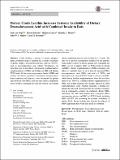Dietary Crude Lecithin Increases Systemic Availability of Dietary Docosahexaenoic Acid with Combined Intake in Rats
Author(s)
van Wijk, Nick; Balvers, Martin; Cansev, Mehmet; Sijben, John W. C.; Broersen, Laus M.; Maher, Timothy J; ... Show more Show less
Download11745_2016_Article_4139.pdf (1.153Mb)
PUBLISHER_CC
Publisher with Creative Commons License
Creative Commons Attribution
Terms of use
Metadata
Show full item recordAbstract
Crude lecithin, a mixture of mainly phospholipids, potentially helps to increase the systemic availability of dietary omega-3 polyunsaturated fatty acids (n-3 PUFA), such as docosahexaenoic acid (DHA). Nevertheless, no clear data exist on the effects of prolonged combined dietary supplementation of DHA and lecithin on RBC and plasma PUFA levels. In the current experiments, levels of DHA and choline, two dietary ingredients that enhance neuronal membrane formation and function, were determined in plasma and red blood cells (RBC) from rats after dietary supplementation of DHA-containing oils with and without concomitant dietary supplementation of crude lecithin for 2–3 weeks. The aim was to provide experimental evidence for the hypothesized additive effects of dietary lecithin (not containing any DHA) on top of dietary DHA on PUFA levels in plasma and RBC. Dietary supplementation of DHA-containing oils, either as vegetable algae oil or as fish oil, increased DHA, eicosapentaenoic acid (EPA), and total n-3 PUFA, and decreased total omega-6 PUFA levels in plasma and RBC, while dietary lecithin supplementation alone did not affect these levels. However, combined dietary supplementation of DHA and lecithin increased the changes induced by DHA supplementation alone. Animals receiving a lecithin-containing diet also had a higher plasma free choline concentration as compared to controls. In conclusion, dietary DHA-containing oils and crude lecithin have synergistic effects on increasing plasma and RBC n-3 PUFA levels, including DHA and EPA. By increasing the systemic availability of dietary DHA, dietary lecithin may increase the efficacy of DHA supplementation when their intake is combined.
Date issued
2016-04Department
Massachusetts Institute of Technology. Department of Brain and Cognitive SciencesJournal
Lipids
Publisher
Springer Berlin Heidelberg
Citation
van Wijk, Nick et al. “Dietary Crude Lecithin Increases Systemic Availability of Dietary Docosahexaenoic Acid with Combined Intake in Rats.” Lipids 51.7 (2016): 833–846.
Version: Final published version
ISSN
0024-4201
1558-9307